Wouldn’t it be great if any time a customer had a question about your product or service, they were referred to your business? Friends and family refer their friends to your business because they trust you and believe in you. But search engines refer your website to internet users only if it seems like the most reliable and trustworthy website.
Getting your website to the first page of the search engine results demonstrates it’s one of the top-performing experts on that topic. It’s like having a premier store on a busy street. It increases your brand awareness quickly as internet users find your website through their searches.
Your goal should be to get on the first page for queries your target market is running. This means the people discovering your website are potential customers who are looking to buy or engage. These people are great sales candidates.
Overview: What is the SERP?
SERP stands for search engine results page. It’s the page that search engines pull up after an internet user submits a search query. The results page will include paid search results, pay-per-click ads, and organic search results.
Search engines rank websites based on the relevancy and number of backlinks to their website. That ranking, plus other factors, determines their position on a SERP page. Getting to the top of the page is highly competitive.
What is the SERP made up of?
Once you run a query on a search engine, it pulls up a number of websites related to your search based on the content on the website. It also displays advertisements, images, videos, and featured snippets. Each of these gives you an opportunity to be on the first page of the search engine results.
1. Paid search results
Search engines make money by selling advertising. The top search results will be paid search results. Companies pay to be at the top of the search results to generate more traffic and faster sales. The first few results are often the ones that are clicked on.
Paid search results resemble organic search results. They are listed under the query bar in the first two or three slots. Google identifies websites that have paid to be displayed with the small Ad designation preceding the URL. Google considers several factors when displaying the paid results, including bid amount, page quality, ad quality, and its relevance to the search.
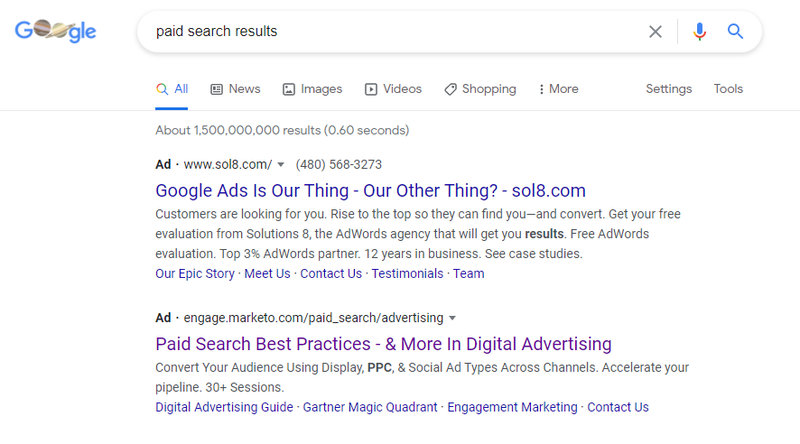
2. Pay-per-click ads
When you type in your query, ads sometimes appear on the sidebar or at the bottom of the results page. Clicking on these links will take you to a website where you can purchase the product.
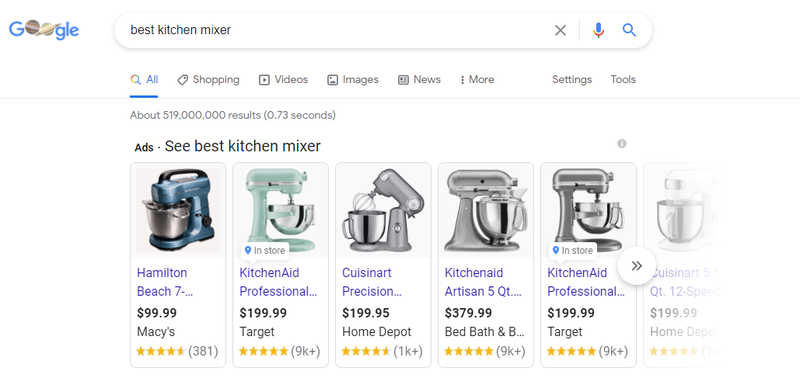
3. Organic search results
Organic search results are the unpaid results that appear based on the keyword topic. They are based on relevance to the user’s search query, backlinks, and domain authority. Organic search results are often in-depth articles and longer pieces of content. They include a link to the website and a short description of the content.
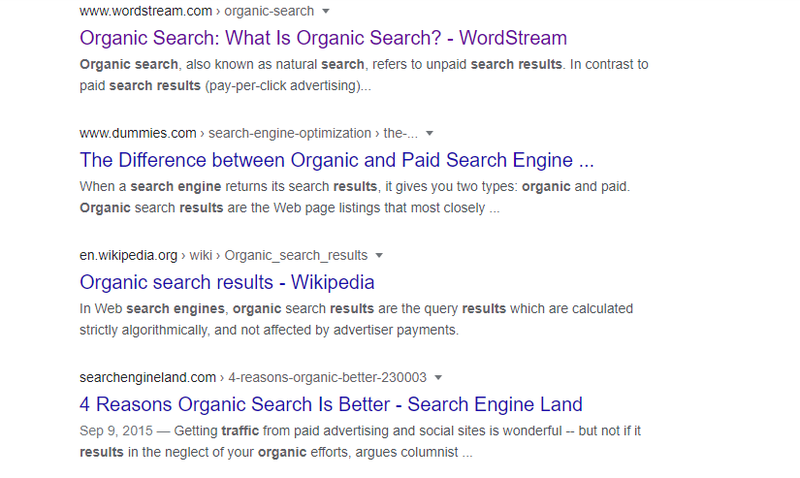
4. Featured snippet
A featured snippet appears on the top of the SERP in a separate box from the results. It attempts to answer the query in a brief description. Featured snippets can make your website stand out on the results page. The snippet displays content from the site that includes applicable keywords. Sites must already be on the first page of search results to earn the coveted featured snippet.
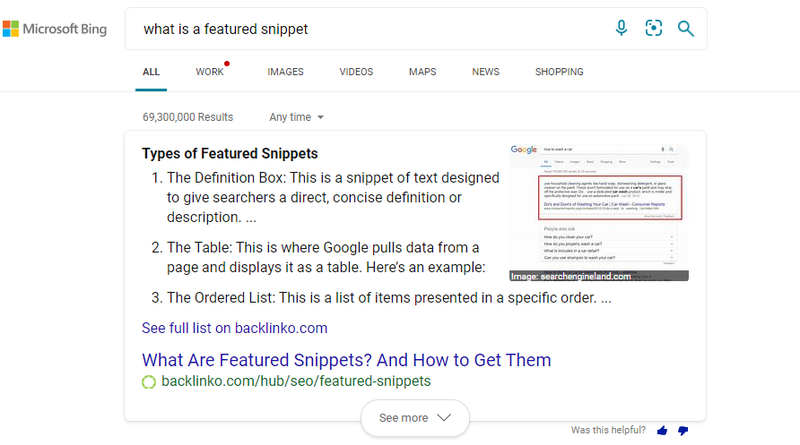
5. Image pack
Search engines determine what visual information would be relevant to the internet user. They often display a row of images and a click-through to a Google images search. Google uses a different algorithm for images than written content. Following these practices will help to rank your image content:
• Use accurate descriptions
• Write image captions and alt text
• Provide relevant surrounding text
• Include an engaging page title
• Use rectangular photos of moderate dimensions (16×9, 4×3, and squares)
If your image is embedded on multiple sites, you’ll have a better chance of appearing in a SERP image pack.
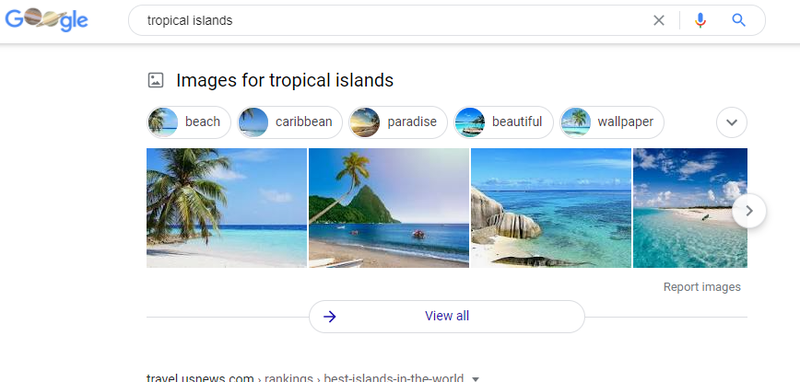
How can your business get on the SERP?
When you perform research on the internet, do you ever make it to the second page of search engine results? Or do you just skim the top results and see which one will be helpful to you?
Most people only check out the top results. The top organic ranking in Google’s search results has an average click-through rate of 31.7%, while 90% of pages get no organic traffic from Google. Getting your business to the top of the search engine results is essential for customers to find you.
These are some ways to ensure your website shows up on the first page for a specific keyword search.
1. Pay for an ad
The fastest way to get to the top of the search results is to pay for clicks to your website. Google and other search engines will immediately display your advertisements, based on attributes such as relevancy, ad quality, and bid price.
2. Submit your website to the search engines
Search engines will definitely find your website without submitting your website to the search engines, but if you do submit it, it may be indexed faster.
Submitting your website improves the way your website is indexed. It shows the search engines your sitemap URL and directs them to the right place to start crawling your website. Your sitemap indicates your most important content. This is important when your homepage doesn’t link to all the essential areas of your website.
3. Create useful keyword-rich content
Search engines pull up results based on useful information for their users. Each page on your website should include a different set of keywords. The right keywords for your business are those that ideal customers are typing in to find the products or services they need.
Keyword research helps you determine what keywords people are searching for and how much competition there will be to get on the first page of the search results. SEO tools will provide valuable information on how many backlinks you’ll need to improve ranking, keyword research, and content exploration for finding new topics.
4. Dominate long-tail keywords
Long-tail keywords are more specific to the searcher’s query. Often people will target shorter keywords because they have a higher number of monthly searches. Targeting long-tail keywords will provide more detailed information that is useful to the user and reduces the competition.
Dominating long-tail keyword search helps you to rise to the top of the SERP faster. Unique keywords help reduce competition. For example, if you try to rank for Italian food, you will be competing with 305 other results. If you try to rank for traditional Italian gelato, you reduce the competition to about 100 other websites. It will be much easier to move to the top of the results by targeting longer keywords.
5. Emphasize your location
A free way to get your website to the first page of Google and other search engines is targeting location-based queries. Ensure your website clearly indicates your city or geographical area. This can be done on your contact page and through blog posts. When people search for your industry and your location, search engines will pick up the information and display your business.
When you emphasize the location of your business, this reduces the competition based on the keyword to only those businesses in your area. It is very targeted to the user and increases the chances that you will appear on the first page of the search results.
6. Create a Google business profile
One of the most powerful tools on the internet is a Google My Business (GMB) profile. Google Maps and Google search pulls from Google My Business to generate local listings.
The GMB listing provides potential clients access to your hours of operation, phone number, website, and directions with the click of a button. The GMB profile gives customers insight into reviews and ratings as well. You can add high-quality images of your business to help potential customers see what you do.
Drive traffic and generate leads with SERPs
Your search position on the SERP determines how many people will notice your business and read your content. Getting to the first page of the search engine results is not just about improving your ranking. It will increase your traffic and generate leads and move customers through your sales funnel. Improving your position in the SERPs is possible even for small businesses. It will get your business the visibility it deserves.
The post What Your Business Needs to Know About SERPs appeared first on The blueprint and is written by Melinda Curle
Original source: The blueprint






